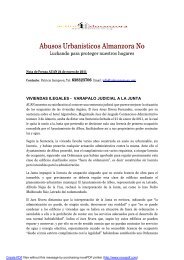European Property Rights and Wrongs - Diana Wallis MEP
European Property Rights and Wrongs - Diana Wallis MEP
European Property Rights and Wrongs - Diana Wallis MEP
You also want an ePaper? Increase the reach of your titles
YUMPU automatically turns print PDFs into web optimized ePapers that Google loves.
misrepresentation of ownership have all caused widespread problems for foreign<br />
buyers. The destabilisation of property markets that results can have a massive<br />
negative impact on the economy <strong>and</strong> reputation of the state.<br />
ELRA<br />
If much of a successful <strong>and</strong> safe real estate transaction is about having access to<br />
the right information <strong>and</strong> correctly administering a transaction to create a registrable<br />
right then the key to successfully managing that process must lie with the<br />
L<strong>and</strong> Registry body. ELRA was created in 2004 by a group of L<strong>and</strong> Registries who<br />
recognised the need for representation <strong>and</strong> co-operation on an EU wide basis.<br />
Their stated aim is the “development <strong>and</strong> underst<strong>and</strong>ing of the role of l<strong>and</strong> registration<br />
in real property <strong>and</strong> capital markets”. They have grown to a membership<br />
of organisations from 20 Member States <strong>and</strong> continue to grow; they are now<br />
co-funded by DG Justice <strong>and</strong> involved in many other EU wide initiatives in the<br />
field of law <strong>and</strong> real property matters. ELRA are leading the way for other professional<br />
organisations to co-ordinate across borders <strong>and</strong> find a common way whilst<br />
respecting local frameworks.<br />
ELRA outline below the CROBECO project which aims to provide a common<br />
framework for purchasing property cross-border throughout the EU Member<br />
States via electronic conveyancing <strong>and</strong> processes, this is an extract from the seminar<br />
presentation given by Gabriel Alonso L<strong>and</strong>eta, President of ELRA.<br />
Modern l<strong>and</strong> registries are the instrument the State utilises to protect real<br />
rights on immovable assets <strong>and</strong> imbue trade with certainty. L<strong>and</strong> registries are<br />
not mere databases. Registration publicity is not mere information, but qualified<br />
information, information with legal value <strong>and</strong> effects.<br />
L<strong>and</strong> registries (LR) dispense reliable information during the decision process<br />
<strong>and</strong> provide legal protection once the right is acquired. But account must be taken<br />
to the fact that not all EU registries have the same organisation <strong>and</strong> the same effects,<br />
<strong>and</strong> not all registries dispense the same degree of protection. In broad terms<br />
we can distinguish two systems in the EU. Deeds system is restricted to filing <strong>and</strong><br />
publicising contracts, to which the system gives the effect of mere third-party enforcement.<br />
Registered contracts prevail over unregistered contracts, but the registry<br />
does not guarantee the buyer’s right. (Negative effect). In the more developed<br />
Title registration systems, only titles <strong>and</strong> jus in rem (rights to things) are entered in<br />
66<br />
Linking up national L<strong>and</strong> Law systems



